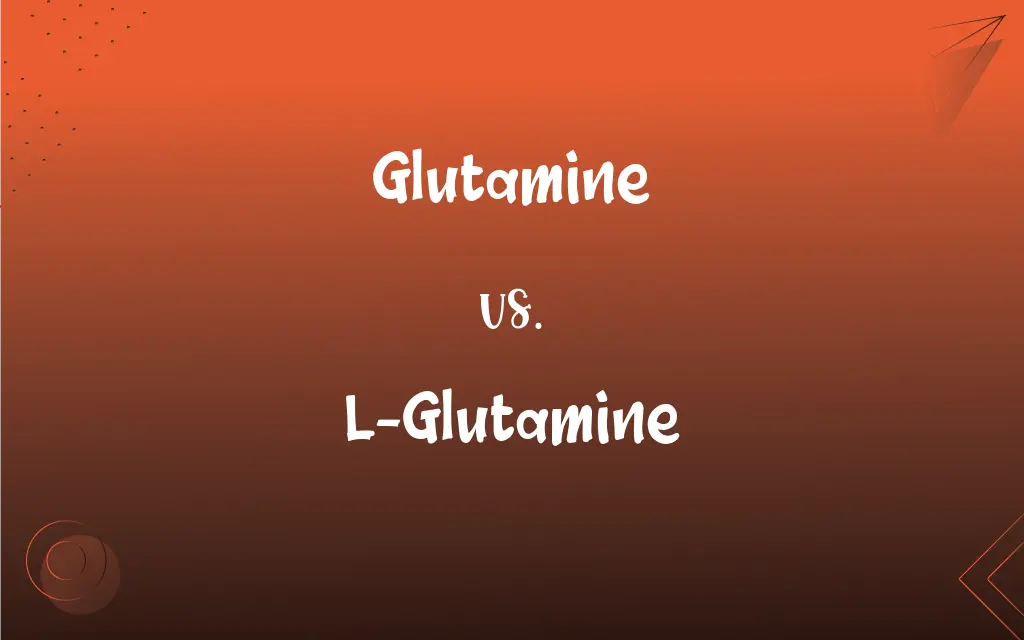Glutamine vs. L-Glutamine: What's the Difference?
Edited by Aimie Carlson || By Janet White || Published on February 15, 2024
Glutamine is an amino acid important for many biological functions, while L-glutamine specifically refers to its naturally occurring isomer form used in proteins and metabolic processes.

Key Differences
Glutamine, an amino acid, plays a vital role in protein synthesis and immune function. L-glutamine is the specific form of glutamine that is biologically active and found in human proteins.
In nutritional supplements, glutamine can refer to either of its isomers or a mixture, but L-glutamine is the form predominantly used and absorbed by the human body. L-glutamine is crucial for gut health and metabolism.
Glutamine serves as a nitrogen donor in various metabolic processes. The L-glutamine form is specifically important in regulating acid-base balance in the kidneys.
Glutamine can be synthesized in the body, while L-glutamine is often supplemented in cases of stress or illness to support recovery and immune function. L-glutamine supplementation is known to benefit intestinal health and recovery from surgery.
Glutamine is involved in the synthesis of other amino acids and glucose. L-glutamine, due to its specific structure, plays a pivotal role in neurotransmitter regulation and brain function.
ADVERTISEMENT
Comparison Chart
Definition
An amino acid used in various biological processes
The natural isomeric form of glutamine used in human proteins
Biological Role
Used in protein synthesis, immune function
Specifically important for gut health, acid-base balance
Isomeric Forms
Can refer to any isomer of glutamine
Refers specifically to the L-isomer
Supplementation
Often a mix of isomers
Specifically L-isomer supplements are used
Specific Functions
Nitrogen donation, amino acid synthesis
Neurotransmitter regulation, brain function
ADVERTISEMENT
Glutamine and L-Glutamine Definitions
Glutamine
Glutamine is a non-essential amino acid involved in protein synthesis.
Glutamine is synthesized in muscles and distributed through the bloodstream.
L-Glutamine
L-glutamine helps in acid-base balance in kidneys.
The kidneys use L-glutamine to produce ammonia, which regulates acid-base balance.
Glutamine
Glutamine supports immune system function.
During times of stress, the body's glutamine stores are utilized to support the immune system.
L-Glutamine
L-glutamine is the biologically active form of glutamine found in human proteins.
L-glutamine is the predominant form of glutamine in dietary supplements.
Glutamine
Glutamine contributes to the body's energy supply.
Glutamine can be converted into glucose when the body needs energy.
L-Glutamine
L-glutamine supports gut health and nutrient absorption.
L-glutamine supplements are often recommended for improving intestinal function.
Glutamine
Glutamine acts as a key nitrogen donor in the body.
In metabolic processes, glutamine donates nitrogen for nucleotide synthesis.
L-Glutamine
L-glutamine aids in recovery and immune function.
Athletes may take L-glutamine supplements to support recovery after intense workouts.
Glutamine
Glutamine is involved in intestinal health and recovery.
Patients with intestinal issues may be given glutamine to aid healing.
L-Glutamine
L-glutamine plays a role in neurotransmitter regulation.
L-glutamine can be converted into glutamate, an important neurotransmitter in the brain.
Glutamine
A nonessential amino acid, C5H10N2O3, occurring widely in plant and animal tissue and proteins and produced commercially for use in medicine and biochemical research.
Glutamine
(amino acid) A nonessential amino acid C5H10N2O3 found in most animal and plant proteins.
Glutamine
A crystalline amino acid occurring in proteins; important in protein metabolism
FAQs
What is L-glutamine?
L-glutamine is the natural isomeric form of glutamine used in human proteins.
Why is L-glutamine used in supplements?
L-glutamine is used because it's the form absorbed and utilized by the human body.
What are the benefits of glutamine supplementation?
It supports immune function, gut health, and recovery from illness or stress.
What is glutamine?
Glutamine is an amino acid important for various biological functions.
How does glutamine support the immune system?
Glutamine provides energy and nitrogen to immune cells.
Can the body produce glutamine?
Yes, glutamine is a non-essential amino acid synthesized by the body.
Are there foods rich in glutamine?
Yes, meat, dairy, eggs, and some vegetables contain glutamine.
Is L-glutamine effective in managing digestive disorders?
It can be beneficial, but should be used under medical guidance.
Can vegetarians get enough L-glutamine?
Yes, through plant sources and supplements if necessary.
What is the difference between glutamine and L-glutamine in supplements?
L-glutamine supplements specifically contain the biologically active isomer.
Can glutamine supplements cause side effects?
Rarely, but high doses might cause digestive issues.
Is L-glutamine important for athletes?
Yes, L-glutamine aids in muscle recovery and immune support for athletes.
What role does L-glutamine play in the gut?
L-glutamine supports intestinal cell health and barrier function.
Can glutamine help with weight loss?
It may aid in muscle maintenance during weight loss, but it's not a weight loss supplement.
Is L-glutamine safe for long-term use?
Generally, yes, but consult a healthcare professional for personalized advice.
How does glutamine aid in recovery?
It helps repair tissues and supports the immune system.
Does L-glutamine improve brain function?
It's important for brain health as it's a precursor to key neurotransmitters.
Can L-glutamine help in stress management?
It supports overall body function during stress, aiding recovery.
Should glutamine be taken on an empty stomach?
It varies, but some suggest taking it on an empty stomach for better absorption.
How does glutamine interact with other medications?
Consult a healthcare professional, as interactions can vary.
About Author
Written by
Janet WhiteJanet White has been an esteemed writer and blogger for Difference Wiki. Holding a Master's degree in Science and Medical Journalism from the prestigious Boston University, she has consistently demonstrated her expertise and passion for her field. When she's not immersed in her work, Janet relishes her time exercising, delving into a good book, and cherishing moments with friends and family.
Edited by
Aimie CarlsonAimie Carlson, holding a master's degree in English literature, is a fervent English language enthusiast. She lends her writing talents to Difference Wiki, a prominent website that specializes in comparisons, offering readers insightful analyses that both captivate and inform.































































